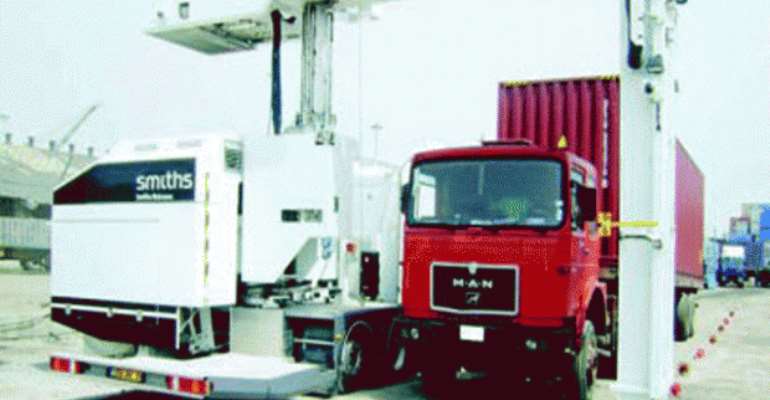NCS refutes cancer claims by Globalscan boss

The Public Relations Officer of Nigeria Customs Service, Deputy Comptroller, Wale Adeniyi, while speaking on the allegation noted: 'We find Udechukwu's 'cancer mongering' quite amusing because of his apparent ignorance of radiation safety knowledge. There has not been a documented case of cancer caused by the use of these scanners anywhere in the world.
'The scanners have multiple fail-safe systems to ensure that they cannot be operated in an unsafe environment. It is for this exact reason that his sites in PTML, Warri and Calabar were declared unsafe for any scanning activity. It is Udechukwu and his company that have safety questions to answer even before handover.'
Diversionary tactics from real facts
According to the NCS PRO, the failed attempt by Udechukwu to change the narrative of DI, hiding behind the façade of capacity gap and cancer mongering should be put in proper perspective.
Mobile scanner
He said: 'Most Nigerians still find it very difficult and disheartening to correlate the amount of money thrown at the SPs, particularly Globalscan, in return for the poor infrastructure, operation, and capacity building and transfer activity delivered so far.
'The seven years of service paid for by the Federal Government in no way represents value for money. Udechukwu's position that the NCS has insufficient capacity to take over is a clear self- indictment by Globalscan.
'We will not allow the criticisms of Udechukwu and his likes to deter us from building our capacity to perform our statutory responsibility. We are already on a steady course, that is self- sustaining and inward looking. Our salvation ultimately lies not in the hands of self-styled desperate arm- chair experts.'
Plan for Operational Safety and Capacity building: As part of the take over plans, he informed that Customs has developed own professional and sustainable scanner training capability, including the professional development of expert trainers.
Adeniyi explained: 'NCS has undertaken an enormous development of training courses for all officers involved in scanning, with specific training for each functional role.
'NCS has also undertaken the selection and delivery of these courses to over 300 NCS officers. This is reinforced by a programme of coaching by experts who have years of experience in operating scanners for Customs around the world.
'NCS has selected 20 officers to act as Radiation Protection Supervisors at each site. These officers report to the NCS Radiation Safety Officer, who holds an MSc. in Physics and has over seven years experience with x-ray scanners.
'All these officers are trained to international standards and qualified from a UK Radiation Safety company and will be further trained and assessed by an NNRA approved establishment.
'All of these activities have been instigated and carried out by NCS as a response to the failure of the SPs to carry out a credible transfer activity. In particular GlobalScan has the worst maintained and operated equipment among the SPs.
Lack of capacity
'It is amusing as much as insulting to be criticized for lack of capacity at the end of a seven year contract which had, as its goal, the establishment of an NCS scanning capacity.'
He further informed that in 2005, the Federal Government had conceived the DI programme as a viable approach to Customs Modernization.
Four companies, he said were engaged on a Build- Own- Operate and Transfer (BOOT) basis over a seven year period to provide the required infrastructure. Globalscan, one of the SPs contracted, he said ' was allotted Seme Border, Ports of Calabar, Warri, Port Harcourt as well as International Airports in Lagos and Port Harcourt.'
He noted: 'One of the obligations of the Company under the contract is the installation of fixed scanner in Seme Border and mobile ones at the other sites. Customs officers were to be trained on operation and maintenance of the scanners during the contract period.
'Citing various excuses, Globalscan did not start construction in Seme site until about two years ago. In the other locations, virtually all the mobile scanners supplied have serious operations and maintenance issues.'
Performance Audit Reports: Several Audit and assessment reports from Accenture, World Bank and Oversight Committees of the National Assembly, according to Adeniyi were unsparing in their indictment of Globalscan's shoddy handling of its sites.
'Last year, the NCS carried out its own audit, supported by a team of consultants. The exercise showed a pitiful state of equipment performance, availability, safety and maintenance, compounded by very poor facilities for staff. The fixed scanner expected to have been delivered half way into the contract period is still under construction, seven years after.
'The mobile one brought to the border as stop gap had hydraulic system failure, rendering it useless since November 2012.
'The situation is worse in PTML (Tin can), Warri and Calabar Ports, where the equipment supplied cannot be used on the basis of poor performance and safety issues' he further explained.

